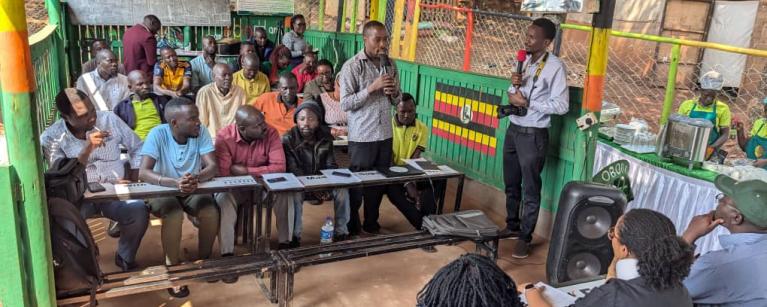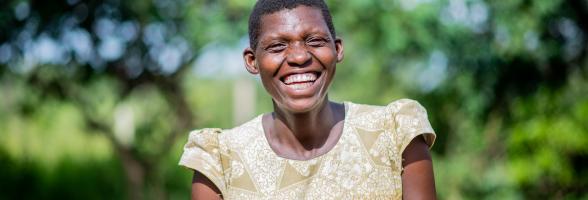In the bustling streets of Kampala, where life whirls around in a constant state of motion, a group of boda boda riders (public motorbike transport in Uganda) stand out not just for their skills on the bike, but for their groundbreaking community advocacy.
On 25 July 2024, Oxfam in Africa Director Fati N’zi-Hassane, while exploring Oxfam Uganda, had the pleasure of meeting with this Boda Boda group, which champions care work. According to Fati, this was one of the highlights of her visit! “ I am truly energized listening to all these experiences,” she said.
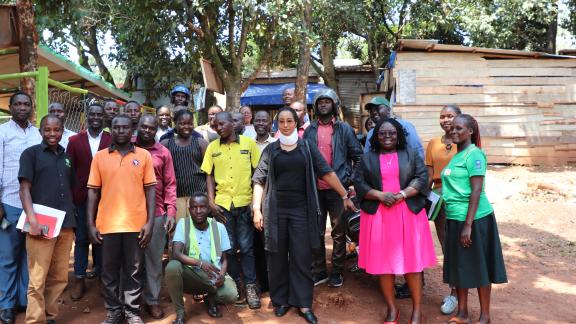
Oxfam in Africa Director Fati N’zi-Hassane, while exploring Oxfam in Uganda met with this Boda Boda group in Nakawa Kampala, who are championing care work
Meet the Male champions living and leading the change
Semata Nelson, a determined and compassionate man, aims to change societal norms and champion male engagement in unpaid care work, a cause close to his heart.
Semata’s journey towards this mission began in his childhood. Raised by a single mother, he was introduced to shared responsibilities early on. "There was no difference between a boy’s and a girl’s role in our home," he recalls. "We took turns cooking, washing, and doing other chores. It was just how we lived." This upbringing instilled in Semata a sense of equality and teamwork, values he carried into adulthood.
“Growing up, there was no difference between a boy's and a girl's role in our home. My mother made sure we took turns cooking, washing, and doing other chores. It was just how we lived.”
However, societal expectations can be persistent and powerful. When Semata married, he fell into the conventional roles that many men assume.
"I used to wash my clothes, but I left all the other work to my wife," he admits. I also stopped her from getting any paid work out of the home.
This imbalance in their relationship eventually led to a significant fallout. His wife left and returned to her parents. She shared her grievances, which included Semata not letting her work and him washing his own clothes, yet as a wife, she expected that would be her role. This deeply rooted notion of gender-specific roles contributed to their separation.
The separation was a wake-up call for Semata. Not only did he lose his wife, but he also later lost his job. On the other hand, his wife found employment and managed to support their three children, with whom she had gone independently. "It was then I realized my mistake," Semata reflects. "I could no longer afford anything, while my wife, who I had stopped from working, was now the breadwinner."
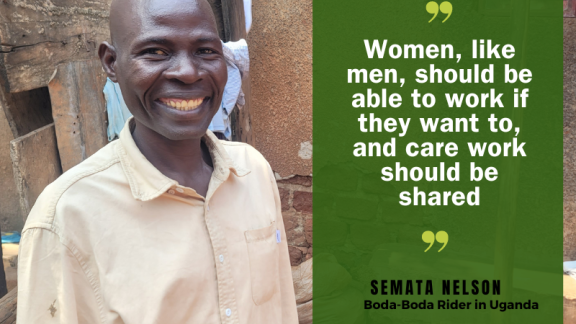
Semata Nelson is a male champion who is pushing to change societal norms and champion male engagement in unpaid care.
Determined to learn from his past, Semata attended training by Gals Forum International (GAFI), an organization supported by Oxfam in Uganda partner UWONET. From the training, he learned the aspect of sharing care work and how that could free women to have time to engage in other economic activities and improve family relations. Although a bit late to save his own marriage, he began advocating for the equal distribution of care work. He encourages other men to understand that sharing these responsibilities is not just fair but essential for a healthy and balanced family life. His message is clear: "Women, like men, should be able to work if they want to, and care work should be shared."
An eye-opening experience with one of his former bosses further reinforced Semata's transformation.
“I once visited my boss and found him washing dishes," he recalls. "He was a wealthy man in a large house with many cars packed in his compound, and I was shocked to see him doing what many consider ‘a woman’s work’. I wondered how a rich man who could afford housemaids was doing care work, yet we were putting our ego first down here. I promised myself to do better but also told my colleagues to change.”
Today, Semata is not just a boda boda rider but a beacon of change, promoting the idea that household responsibilities should not be gender-specific. He often speaks to young men, urging them to view their wives as partners and friends and share equally in the care work. "When you marry, make your wife a friend," he advises. "Support each other in every aspect of life."
“I regret that I changed when my wife had already left with the children, and I have no relationship with the children now.” All Semata’s attempts to get his wife back have been fruitless, but he hopes that maybe one day they will get back together, and he is sure he will be a better husband.
Socialisation key in addressing unpaid care work
According to Rita Aciro, the UWONET Executive Director, socialization is key to addressing unpaid care work. “Semata’s mother normalized care work so Semata could even wash his own clothes. At the same time, we see that societal norms are entrenched and influence Semata’s behavior, which cost him his marriage.”
Inspired
Fati was inspired and honoured to listen to Semata's journey.
“When we speak to the leaders, we tell them what we think the fight against inequality should look like. They listen to us because they know that our work starts in places like this and engaging people like you. Change does not happen at the UN level. It starts with us and individuals with the way we do things.”
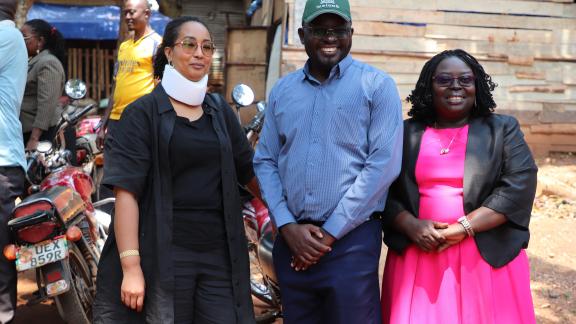
Oxfam in Africa Director Fati N’zi-Hassane, Oxfam in Uganda Country Director Francis Shanty Odokorach and UWONET Executive Director Rita Aciro interacted with boda boda riders in Nakawa
The Change is Visible
One story after the other, the men in this boda boda group have taken change into their hands.
“I cannot start to explain how much these bodaboda men have transformed. I handled endless domestic cases daily, but these have decreased a lot since the training. Marriage is now an institution young people hope to join when they grow up, which was not the case previously.”
Semata is just one of the many men in this group who have great experience.
Sempijja is also Redefining Masculinity and Family dynamics.
Sempijja Steven, is championing male engagement in unpaid care work, illustrating its profound benefits for families and society.
Sempijja grew up with the understanding that a wife's role was to comfort her husband, as prescribed by his religious teachings, and that the man was the head of the household. "Religion and culture are good," he acknowledges, "but they can have negative aspects depending on interpretation." This rigid interpretation initially guided Magala's actions within his marriage.
Initially, Sempijja was firm in his belief that his wife needed to understand who the head of the family was. He recounts a time when, during a misunderstanding, he had his wife arrested to assert his dominance. "To prove my power as a man," he explains, "I did not help out with domestic work, even when I was home."
The turning point came when Sempijja attended a training session organized by the Gals Forum International (GAFI). The training focused on understanding family dynamics and sharing care work to free up time for women to engage in productive jobs. This training prompted deep reflection and self-examination. "I started wondering why my daughter always said that if anyone beat her, she would report to her mother, not to me," he says. "I realized I had no real relationship with her and was seen more as a terrorist than a father when I was home."
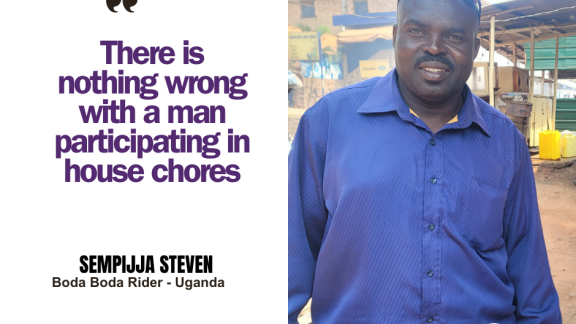
Sempijja Steven, is championing male engagement in unpaid care work
Determined to change, Sempijja began to mend his relationship with his family. This worked as they even started calling each other loving names like “babe,” which was never the case before. The wife later requested him to help out with the dishes. He started by secretly helping his wife with the dishes inside the house, worried about what the neighbors might think. Gradually, his actions moved from inside the house to the open. "For my girl, we agreed that I would bathe her on Fridays, Saturdays, and Sundays. Our relationship improved, and she began coming to me when she had issues."
As Sempijja’s confidence grew, he began performing domestic chores openly, despite the neighbors' gossip. "I told them there is nothing wrong with a man participating in house chores," he asserts. Because we help each other out, we run a family saloon my wife attends to as I do my boda boda work. When I come home from work, I find the food ready, but then I do the dishes and feed our daughter. I also sometimes take her food to the saloon if she works late.
Sharing care work has allowed his wife more time for income-generating activities, strengthening their financial stability. "At the beginning of the school term, my wife bought the requirements, and I paid the school fees," Sempijja explains. Our daughter is now in the middle class. When their second child was born, and an extended hospital stay was necessary because of medical complications, his wife contributed 500,000 UGX. "If my wife were not working, I would not be able to balance paying school fees, providing for the family, and ensuring good welfare for us with just the boda boda income." Because of this collaboration, our love has grown, and more importantly, my daughter is now my good friend
Challenging Patriachy
According to Oxfam in Uganda County Director Francis Shanty Odokorach, “Sharing unpaid care work fosters a stronger family bond and contributes to economic stability, personal fulfilment, and happy longer lives.
“By challenging traditional roles and embracing a more equitable partnership, men like Sempijja are not just redefining masculinity for themselves but also setting a powerful example for their community.” When I say I am a feminist, many people ask me what I mean and do. How I wish those who want to know male feminists come here and see what this group of boda bodas is doing.”
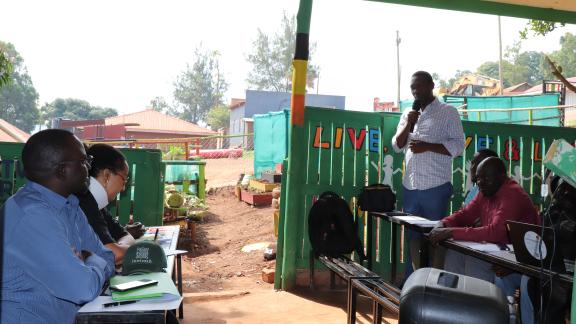
Oxfam in Africa Director Fati N’zi-Hassane, and Oxfam in Uganda Country Director Francis Shanty Odokorach met with boda boda riders in Nakawa who are championing male engagement in care work
Change Needs to Happen at Scale
Following the visit, Oxfam in Africa Director Fati N’zi-Hassane said,
“Other men in Africa need to hear these stories. Life gets busy, and it's important that after the hustle of the day, you have a good, peaceful, loving home to go to. We need to find ways to share these powerful stories beyond here and across Africa.”
The Oxfam WE-Care Programme works towards a just and inclusive society by recognizing, reducing, and redistributing UCDW. We envision a world where women and girls have more choices at every stage of their lives. So, we work to ensure carers’ voices are heard in decision-making about policies and budgets at all levels.
UWONET, supported by Oxfam, is working with partners such as Gals Forum International to create an understanding of unpaid care work in communities and ensure the redistribution of care work. One key approach is working with groups of people that are less targeted yet highly patriarchal, like the boda bodas. Through this, they have modeled change agents like Semata and Sempijja.
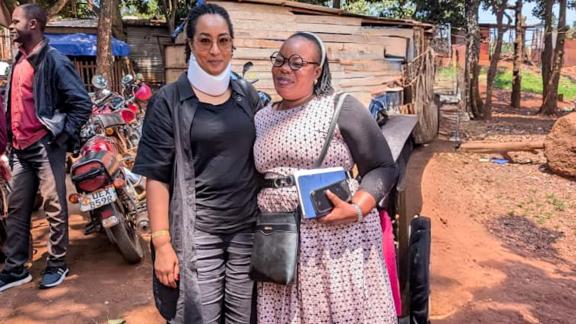
Prossy Bukenya who trained with GAFI and UWONET has been instrumental in the WECARE program where she has led many community discussions on WECARE and unpaid care work. Notably she has worked with a number of boda boda riders encouraging them to share work and responsibilities with their partners.
Tapping into experience working with communities and the skills she got from GAFI through UWONET and Oxfam in Uganda, Prossy is taking her influence as a leader further.
She now plans to contest in the 2026 elections for a position in the Nakawa division Council. She is confident and inspired by women leaders.
Written by Dorah Ntunga | Media and Communications Coordinator | Oxfam in Uganda
